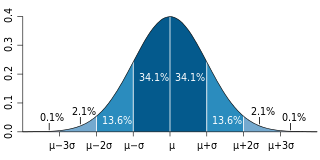Related Research Articles
Free will is the capacity or ability to choose between different possible courses of action.

Determinism is the philosophical view that all events in the universe, including human decisions and actions, are causally inevitable. Deterministic theories throughout the history of philosophy have developed from diverse and sometimes overlapping motives and considerations. Like eternalism, determinism focuses on particular events rather than the future as a concept. The opposite of determinism is indeterminism, or the view that events are not deterministically caused but rather occur due to chance. Determinism is often contrasted with free will, although some philosophers claim that the two are compatible.

Incompatibilism is the view that the thesis of determinism is logically incompatible with the classical thesis of free will. The term was coined in the 1960s, most likely by philosopher Keith Lehrer. The term compatibilism was coined to name the view that the classical free will thesis is logically compatible with determinism, i.e. it is possible for an ordinary human to exercise free will, even in a universe where determinism is true. These terms were originally coined for use within a research paradigm that was dominant among academics during the so-called "classical period" from the 1960s to 1980s, or what has been called the "classical analytic paradigm". Within the classical analytic paradigm, the problem of free will and determinism was understood as a compatibility question: "Is it possible for an ordinary human to exercise free will when determinism is true?" Those working in the classical analytic paradigm who answered "no" were incompatibilists in the original, classical-analytic sense of the term, now commonly called classical incompatibilists; they proposed that determinism precludes free will because it precludes the ability to do otherwise. Those who answered "yes" were compatibilists in the original sense of the term, now commonly called classical compatibilists. Given that classical free will theorists agreed that it is at least metaphysically possible for an ordinary human to exercise free will, all classical compatibilists accepted a compossibilist account of free will and all classical incompatibilists accepted a libertarian account of free will.

Fatalism is a family of related philosophical doctrines that stress the subjugation of all events, actions, and/or behaviors to fate or destiny, and is commonly associated with the consequent attitude of resignation in the face of future events which are thought to be inevitable and outside of human control.
Compatibilism is the belief that free will and determinism are mutually compatible and that it is possible to believe in both without being logically inconsistent. As Steven Weinberg puts it: "I would say that free will is nothing but our conscious experience of deciding what to do, which I know I am experiencing as I write this review, and this experience is not invalidated by the reflection that physical laws made it inevitable that I would want to make these decisions." The opposing belief, that the thesis of determinism is logically incompatible with the classical thesis of free will, is known as "incompatibilism".

Libertarianism is one of the main philosophical positions related to the problems of free will and determinism which are part of the larger domain of metaphysics. In particular, libertarianism is an incompatibilist position which argues that free will is logically incompatible with a deterministic universe. Libertarianism states that since agents have free will, determinism must be false and vice versa.

Hard determinism is a view on free will which holds that determinism is true, that it is incompatible with free will, and therefore that free will does not exist. Although hard determinism generally refers to nomological determinism, it can also be a position taken with respect to other forms of determinism that necessitate the future in its entirety.

Ted Honderich is a Canadian-born British professor of philosophy, who was Grote Professor Emeritus of the Philosophy of Mind and Logic, University College London.

Harry Gordon Frankfurt was an American philosopher. He was a professor emeritus of philosophy at Princeton University, where he taught from 1990 until 2002. Frankfurt also taught at Yale University, Rockefeller University, and Ohio State University.
Peter van Inwagen is an American analytic philosopher and the John Cardinal O'Hara Professor of Philosophy at the University of Notre Dame. He is also a research professor of philosophy at Duke University each spring. He previously taught at Syracuse University, earning his PhD from the University of Rochester in 1969 under the direction of Richard Taylor. Van Inwagen is one of the leading figures in contemporary metaphysics, philosophy of religion, and philosophy of action. He was the president of the Society of Christian Philosophers from 2010 to 2013.
Robert Hilary Kane was an American philosopher. He was Distinguished Teaching Professor of Philosophy and a professor of law at the University of Texas at Austin.
Philosophy is the study of general and fundamental problems concerning matters such as existence, knowledge, values, reason, mind, and language. It is distinguished from other ways of addressing fundamental questions by being critical and generally systematic and by its reliance on rational argument. It involves logical analysis of language and clarification of the meaning of words and concepts.
Theological determinism is a form of predeterminism which states that all events that happen are pre-ordained, and/or predestined to happen, by one or more divine beings, or that they are destined to occur given the divine beings' omniscience. Theological determinism exists in a number of religions, including Jainism, Judaism, Christianity, and Islam. It is also supported by proponents of Classical pantheism such as the Stoics and by philosophers such as Baruch Spinoza.
In philosophy, moral responsibility is the status of morally deserving praise, blame, reward, or punishment for an act or omission in accordance with one's moral obligations. Deciding what counts as "morally obligatory" is a principal concern of ethics.
Frankfurt cases were presented by philosopher Harry Frankfurt in 1969 as counterexamples to the principle of alternate possibilities (PAP), which holds that an agent is morally responsible for an action only if that person could have done otherwise.
Metaphysics is the branch of philosophy that investigates principles of reality transcending those of any particular science. Cosmology and ontology are traditional branches of metaphysics. It is concerned with explaining the fundamental nature of being and the world. Someone who studies metaphysics can be called either a "metaphysician" or a "metaphysicist".
The following outline is provided as an overview of and topical guide to metaphysics:
Derk Pereboom is the Susan Linn Sage Professor in Philosophy and Ethics at Cornell University. He specializes in free will and moral responsibility, philosophy of mind, philosophy of religion, and the work of Immanuel Kant.
Keith Frankish is a British philosopher specializing in philosophy of mind, philosophy of psychology, and philosophy of cognitive science. He is an Honorary Reader at the University of Sheffield, UK, Visiting Research Fellow with The Open University, and adjunct Professor with the Brain and Mind Programme at the University of Crete. He is known for his "illusionist" stance in the theory of consciousness. He holds that the conscious mind is a virtual system, a trick of the biological mind. In other words, phenomenality is an introspective illusion. This position is in opposition to dualist theories, reductive realist theories, and panpsychism.
Abilities are powers an agent has to perform various actions. They include common abilities, like walking, and rare abilities, like performing a double backflip. Abilities are intelligent powers: they are guided by the person's intention and executing them successfully results in an action, which is not true for all types of powers. They are closely related to but not identical with various other concepts, such as disposition, know-how, aptitude, talent, potential, and skill.
References
- 1 2 3 Kane 2011, p. 26.
- ↑ Holroyd 2010, p. 110.
- 1 2 Pereboom 2008, p. 472.
- ↑ Lenman 2002, p. 4.
- ↑ Lenman 2002, p. 6.
- ↑ Lenman 2002, p. 15–17.
Reference bibliography
- Kane, Robert (2011). "Introduction: The Contours of Centemporary Free-Will Debates". In Kane, Robert (ed.). The Oxford Handbook of Free Will. Oxford Handbooks in Philosophy (2nd ed.). Oxford University Press. ISBN 9780195399691.
- Holroyd, J. (2010). "The Metaphysics of Relational Autonomy". In Witt, Charlotte (ed.). Feminist Metaphysics: Explorations in the Ontology of Sex, Gender and the Self. Springer. ISBN 9789048137831.
- Lenman, James (2002). "On the alleged shallowness of compatibilism: A critical study of Saul Smilansky: Free Will and Illusion" (PDF). Iyyun: The Jerusalem Philosophical Quarterly. 51 (1): 63–79. ISSN 0021-3306.
- Pereboom, Derk (2008). "Why We Have No Free Will and Can Live Without It". In Russ, Joel; Shafer-Landau, Feinberg (eds.). Reason And Responsibility: Readings in Some Basic Problems of Philosophy (13th ed.). Cengage Learning. ISBN 9780495094920.